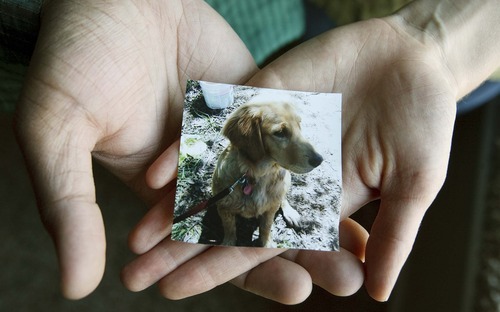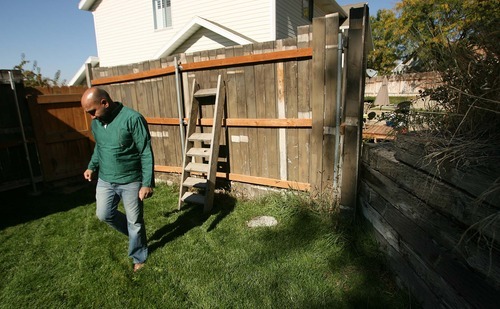This is an archived article that was published on sltrib.com in 2012, and information in the article may be outdated. It is provided only for personal research purposes and may not be reprinted.
The Pammi family's golden retriever, Rusty, dropped dead this summer just minutes after a lawn-care company treated their next-door neighbor's backyard with an herbicide.
Autumn Pammi shared her family's story in a letter to The Standard-Examiner, urging others to avoid their anguish — or worse, the sorrow they might have suffered had it been their toddler daughter instead of their dog in harm's way.
"We can be lulled into complacency about things that occur around us," the North Salt Lake resident wrote, "until another death sparks outrage and interest in the inappropriate use of herbicides and pesticides."
At the same time, Murray resident Elva Jensen was waiting to hear how state regulators would resolve a complaint she had made about herbicide drifting into her yard on a windy day. Jensen had been stunned to discover that pest companies aren't required to post notice when they spray in Utah.
Then she stumbled upon New York's Neighbor Notification Law for pesticides. It occurred to her: "Why not try something like that here?"
"Applications are so common, I can't understand why people wouldn't want [the notification law] when it protects our property, our pets and people," said Jensen, the mother of a teen survivor of non-Hodgkin's lymphoma, a cancer thought to be caused by environmental exposures.
The push for a neighbor notification law is, perhaps, a sign of the times in Utah and elsewhere. The thinking goes: People should have a right to protect themselves against "chemical trespass," especially in a world where pesticides are a part of daily life.
In Utah, frustrated residents in Sevier and Utah counties have challenged mosquito spraying.
In New York, the law applies to pesticide applicators and homeowners who apply the chemicals on their own in counties that have opted in, but it does not apply to government agencies or agricultural land.
For lawn-care companies and pest professionals, residents within 150 feet of an application site must be notified 48 hours in advance. Many companies send postcards. Meanwhile, retailers post signs near the pesticides to let customers know they must post warnings on their lawns after they apply it.
Adrienne Espisito, executive director of the New York-based Citizens Campaign for the Environment, said the law, driven by public demand and passed in 2000, is a hit in her state.
"We have enough problems in life," she said, "we shouldn't be poisoning our communities and our health."
Clark Burgess, who leads Utah's pesticide office, doubts that such an approach would work here, where about 11,000 pesticide products are in use. "I don't know how that's realistically possible," he said.
Not only would it be costly for the companies and their customers, but Burgess noted it would be nearly impossible to enforce, with just four full-time inspectors statewide.
Fumitoxin, blamed for the February 2010 deaths of two sisters, 4-year-old Rebecca Toone and 15-month-old Rachel, in Layton, has since been banned for residential use. About 300 pesticides used in Utah require pest companies to give homeowners written notification when they are used. But companies don't have to notify neighbors, Burgess pointed out.
Instead, his agency focuses on complaints from people concerned about drifting pesticides, like Jensen, and pesticide-related injuries, like the Pammis.
In Jensen's case, the lawn-care company and employee who applied the pesticide on the windy day both got hit with $100 fines. In the Pammis' case, there was no way to prove that pesticide had anything to do with Rusty's death because her body was cremated before tests could be done.
Neal Lewis, executive director of the Sustainability Institute at Molloy College, wrote New York's law. It took his team eight years to get it passed, a sign that it might be awhile before citizen efforts for a neighbor notification law succeed in Utah.
"It's been dramatically beneficial in making changes in the products the industry uses," he said, pointing to a shift away from chemical pesticides and toward more benign soaps and oils. "It's not controversial anymore."
Jensen has tried contacting her legislator for help — so far without any luck. But she's hoping others might join her in the campaign.
Pammi thinks it sounds like a great idea. As her 13-month-old daughter, Leela, toddles around the living room, chattering happily to herself, Pammi wonders what might have happened had her toddler — instead of Rusty — been playing in the yard when the man in the protective suit sprayed what he described as a harmless herbicide.
"I'm glad to know somebody is pursuing legislation," Pammi said. "People should take it seriously, what is being sprayed."
fahys@sltrib.comTwitter: @judyfutah —
What's happening
A Murray woman hopes to see Utah take up what she sees as a common-sense approach to dealing with pesticide problems in neighborhoods where some homeowners hire lawn-care companies to apply chemical treatments to their lawns and trees. She points to New York's Neighbor Notification Law as a step forward. Utah's top regulator doubts such a law would work here.









